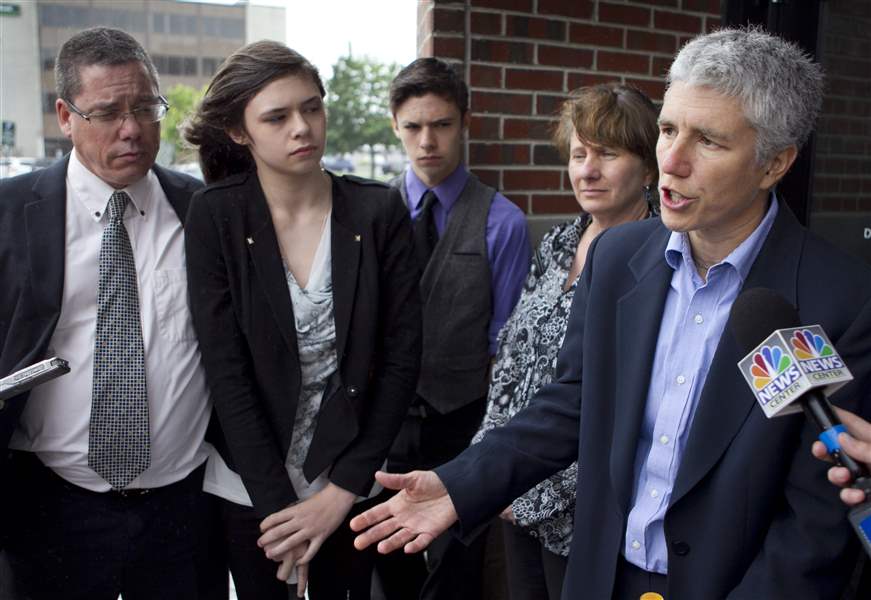
Transgender student suit goes to Maine high court
6/12/2013
Jennifer Levi is the attorney for transgender student Nicole Maines, second from left.
ASSOCIATED PRESS

Transgender student Nicole Maines, center, with her father Wayne Maines, left, and brother Jonas, speaks to reporters.
BANGOR, Maine — Maine’s highest court heard arguments Wednesday over whether transgender students can use the bathroom of their choice, and the girl at the heart of the case said she hoped justices would recognize the right of children to attend school without being “bullied” by peers or administrators.
Nicole Maines, now 15, watched lawyers argue over whether her rights were violated when the Orono school district required her to use a staff bathroom after there was a complaint about her using the girls’ bathroom.
Maines said after the hearing in Bangor that she hopes the Supreme Judicial Court will ensure no one else experiences what she went though.
“I hope they understood how important it is for students to be able to go to school and get an education and have fun and make friends, and not have to worry about being bullied by students or the administration, and to be accepted for who they are,” said Maines, who now attends a high school in southern Maine.

Jennifer Levi is the attorney for transgender student Nicole Maines, second from left.
Her family and the Maine Human Rights Commission sued in 2009 over the school’s actions, but a state judge ruled that the school district acted within its discretion. Maines is a biological male who from an early age identified as a girl.
At issue is whether the school violated the Maine Human Rights Act, which bars discrimination based on sex or sexual orientation. State law also requires separate bathrooms for boys and girls in schools.
Melissa Hewey, lawyer for the school and school district, said afterward it should be up to the Legislature to clarify the issue.
“To the extent that the people in Maine decide that this law in Maine should be changed, then that should be done. But right now the law is what it is, and our school district didn’t violate it,” she said.
The case goes beyond just the bathroom issue to the broader question of what’s best for transgender students, said Jennifer Levi, director of Transgender Rights Project for the Gay & Lesbian Advocates & Defenders.
“At the core of this case is whether the promise of equal educational opportunities for transgender students is realized,” she said.
It’s a topic that school administrators are grappling with nationwide. A similar lawsuit is playing out in Colorado, where the parents of a 6-year-old transgender girl are suing their school district for trying to make her use a separate bathroom.
Policies about transgender adults are still evolving, and the thinking about how to handle children who identify with the gender opposite of the one they’re born with is even more complex.
Last year, the American Psychiatric Association removed “gender identity disorder” from its list of mental health ailments. And the Maine Chapter of the American Academy of Pediatrics filed a brief urging that transgender children be allowed to use the bathroom of their choice.
School officials initially allowed Nicole Maines to use the girls’ bathroom in her school, but the policy was altered after the grandfather of a fifth-grade boy complained to school officials. Maines’ attorneys said she felt like she was singled out by having to use the staff bathroom.
“In her owns words, she said it was like being picked out of a crowd of students and being told, ‘They’re the normal students, and you’re not,’” said Levi, who argued the case for the family.
Outside court, Maines’ father struggled to maintain his composure as he gave a brief statement.
“It has been extremely difficult, but I’m pleased to be here and to have our case heard, and I’m very hopeful for a good outcome,” Wayne Maines said.